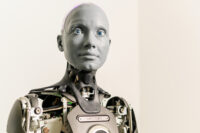What’s to be done when those we love and care about become the potential agents of our own demise? This pandemic presents us with an entirely foreign situation in America, where we have been largely spared the horror and pathos of war and the intimate experience of death surrounding us. Facing the horror of this type of scenario is traumatic; are we to abandon our loved ones to the vagaries of an over-stretched medical system that cannot provide loving and compassionate care? The very thought of it is nearly unspeakable, but I bring it up for precisely that reason.
Human society is rooted in intimate relationships; we are social animals who form bonds that tie us together into groups. Many primates display group bonding and behavior, as do some other animal species where such coherence provides collective benefit through warning of danger, food collection, raising of young, and social stability.
The most obvious example of human bonding appears after childbirth: the essential connection between mother and child. Human children are totally dependent upon their mothers for protection, nutrition, and learning — survival itself. Human childhood exhibits the longest period of dependence shown by any animal.
The formation of family groups are a logical extension of the primal social connection of mother and child. Fathers and other close relatives — siblings, cousins and grandparents — easily form social groups based upon familial bonds. And the gathering of family groups into troops or clans, as seen in Chimpanzees or Bonobos, is also natural to people.
As the human population has increased, the inclination and necessity for social bonding has not diminished. To be sure, there are unfortunate variations in human society that create anomalies, individuals without the ability to form empathic bonds or who even develop sociopathic behaviors that harm others. Overall, however, intimacy and social bonding has been an essential strength of humanity.
Now we are being tested by pandemic conditions that run entirely counter to the thread of social bonding that we’ve relied upon for so long. Social distancing is diametrically opposed to physical comfort offered through hugging, kissing, holding hands, walking closely together, care during illness, gathering for meals and rituals of friendship; these are the ties that bind, and tearing them reverberates across eons of psychological development.
The economic impacts that will derive from the pandemic may last for years, but for many the social and psychological impacts of this situation may last a lifetime. In this sense, we are witness to human events of a tectonic scale; rather than coming together to help one another during a disaster, we are being forced to split apart. Husbands, wives and children in the same household face great uncertainty if one member of the family contracts the Corona Virus. It will be virtually impossible for the rest of the family to avoid being infected.
We potentially face one of the greatest crises in human history, and the social and interpersonal solutions we’ve previously had at our disposal are being torn from our grasp. Although alternative modes of communication exist that are helpful, none of the them are a substitute for physical care and intimacy, and completely fail to be of any use within a family unit.
The choices we face are terrible: to stay together and all get sick, or break apart and suffer alone. Conversations and planning need to happen now, before the proverbial “shit hits the fan.”






Be First to Comment